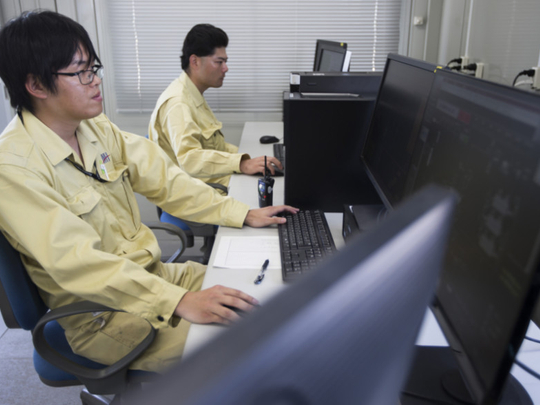
In the United States, there’s no end to stories and listicles and books telling you how to work more productively so you can spend more time with your family or doing the things you love.
In Japan, there’s not even a term for “work-life balance”. What there is, though, is a word for “death by overwork”. It’s “karoshi”, and it’s considered such an inevitable result of Japan’s notoriously gruelling work culture that it’s hardly even discussed.
But every year, hundreds, maybe thousands, of Japanese people literally work themselves to death.
Kiyotaka Serizawa was one of them.
A year ago in July, the 34-year-old killed himself after working crazy hours — 90 hours a week during the last weeks of his life — at a company that does maintenance at apartment buildings.
“His colleagues told me that they were amazed how much he worked,” his father, Kiyoshi Serizawa, said in an interview in their family home. “They said they’d never seen anyone who didn’t even own the company work so hard.”
Japan has a working culture where spending long hours at the grindstone, or in compulsory socialising with superiors after work, is the norm.
It began in the 1970s, when wages were relatively low and employees wanted to maximise their earnings. It continued through the boom years of the 1980s, when Japan became the world’s second-largest economy and everyone was on the juggernaut.
And it remained after the bubble burst in the late 1990s, when companies began restructuring and employees stayed at work to try to ensure they weren’t laid off.
Still, irregular workers — who worked without benefits or job security — were brought in, making the regular workers toil even harder.
Now, no one blinks an eyelid at 12-hour-plus days.
“In a Japanese workplace, overtime work is always there. It’s almost as if it is part of scheduled working hours,” said Koji Morioka, an emeritus professor at Kansai University who is on a committee of experts advising the government on ways to combat “karoshi”. “It’s not forced by anyone, but workers feel as if it’s compulsory.”
While the basic work week is 40 hours, many workers don’t put in for extra hours for fear of being given a bad performance evaluation. This has led to the concept of “service overtime” — “service” being Japanese for “free”.
This relentless schedule has led to “karoshi” — either from a fatal heart attack or stroke, or a suicide triggered by overwork — becoming a recognised cause of death. Labour ministry figures show that 189 deaths were classified this way last year, although experts think the actual number is in the thousands.
“Karoshi” has long been considered a male problem, but advocates say they’re seeing an increasing number of women dying, almost always by killing themselves.
The striking thing about them is that they’re very young, often in their 20s, said Hiroshi Kawahito, a lawyer and secretary-general of the National Defence Counsel for Victims of Karoshi, which fights for victims’ families.
Kawahito represented the family of a journalist in her early 30s who died of a heart attack. When a reporter gasped, he added: “It’s actually not rare in Japan for people in their early 30s to have heart attacks.”
Once a death is classified as “karoshi”, a victim’s family is automatically entitled to compensation through a kind of workers’ compensation system. The number of claims for “karoshi”-related cases rose to a record high of 2,310 in the year ending in March, government figures show.
But less than a third of applications are successful, Kawahito said.
Kiyotaka Serizawa’s death was officially certified in June. He was a supervisor responsible for overseeing building janitors in three separate locations in this town northeast of Tokyo.
Struggling to keep up, Kiyotaka had tried to resign a year before his death, but his boss refused to accept his notice. Apparently concerned about inconveniencing his subordinates, he carried on working.
He would sometimes stop at his parents’ house to sleep as he drove between offices. “He would lie here on this couch and go into such a deep sleep that I would come and check on him to make sure his heart was still beating,” said his mother, Mitsuko Serizawa.
The last time his mother saw him was July last year, when he came to collect the laundry he’d been too busy to do. He stopped off for 10 minutes and watched some cute cat videos on his phone with his cat-mad mother.
But then, on July 26, he went missing. Three weeks later, his body was found in his car in Nagano Prefecture, not far from a place where he’d gone on family camping holidays as a child. He’d burnt briquettes in his car and died from carbon monoxide poisoning.
Although “karoshi” has been a problem for several decades, it was only 18 months ago that the government passed legislation to try to tackle the problem.
The act sets specific targets, such as reducing the percentage of employees working for more than 60 hours a week to 5 per cent by 2020, from the 8 to 9 per cent range recorded in the past few years.
The government is also trying to get employees to actually take their paid vacation leave. Most Japanese workers get 20 days leave a year, but few take even half of that because of a working culture in which taking days off is seen as a sign of slacking or lack of commitment to the job.
The government hopes to entice workers to take at least 70 per cent of their leave owed.
“If you’re conscious of this right, then you can show that there’s nothing wrong with taking time off,” said Yasukazu Kurio of the ministry of health and labour’s office for the prevention of “karoshi”. Kurio is trying to set a good example: last year he took 17 of his 20 days.
Kawahito, the lawyer, said that the government’s efforts could have some impact at the margins but that they don’t deal with the fundamental problem.
“There’s nothing that’s stated under this act to penalise companies that break the rules,” said Kawahito, who’s not exactly a role model for work-life balance. As a younger lawyer, he used to work long hours, but now that he’s reached the age of 66, he’s cut back to about 60 hours a week.
Still, he wants to see a law like the European Working Time Directive that stipulates 11 hours off between shifts.
The “karoshi” problem is exacerbated by the relative weakness of labour unions, which have been primarily concerned with raising wages rather than shortening working hours, and the Japanese practice of having a job for life. Most university students go into a company or a ministry after graduation with the expectation they’ll be there until they retire.
“In a country such as the US, people have more freedom to move to a company that treats you better,” said Kenichi Kuroda, a professor at Meiji University in Tokyo who specialises in labour culture. “But in Japan, people tend to stay at one company for life, so it’s difficult for people to move on.”
Some companies, especially in the financial sector, are taking the initiative by allowing employees to come in earlier and leave earlier. So instead of working from nine to nine, they’re now working from seven to seven and can be home in time to see their children.
“These companies are finding ways to bring about social change, and it could influence other companies by showing how they’re creating a ‘dream lifestyle’,” Kuroda said, laughing to show he knew 12-hour days would not be considered revolutionary elsewhere.
Still, the problem is going to be difficult to alleviate.
Japan’s population is ageing rapidly, with the workforce expected to shrink by at least a quarter by 2050. That means even fewer people available to work, increasing the workloads of those who remain.
Morioka, the professor, said that eliminating death by overwork will mean changing the entire working culture of Japan.
“It’s impossible to get rid of ‘karoshi’ alone,” he said. “We need to change the overtime culture and create the time for family and hobbies. Long working hours are the root of all evil in Japan. People are so busy they don’t even have the time to complain.”
–Washington Post












